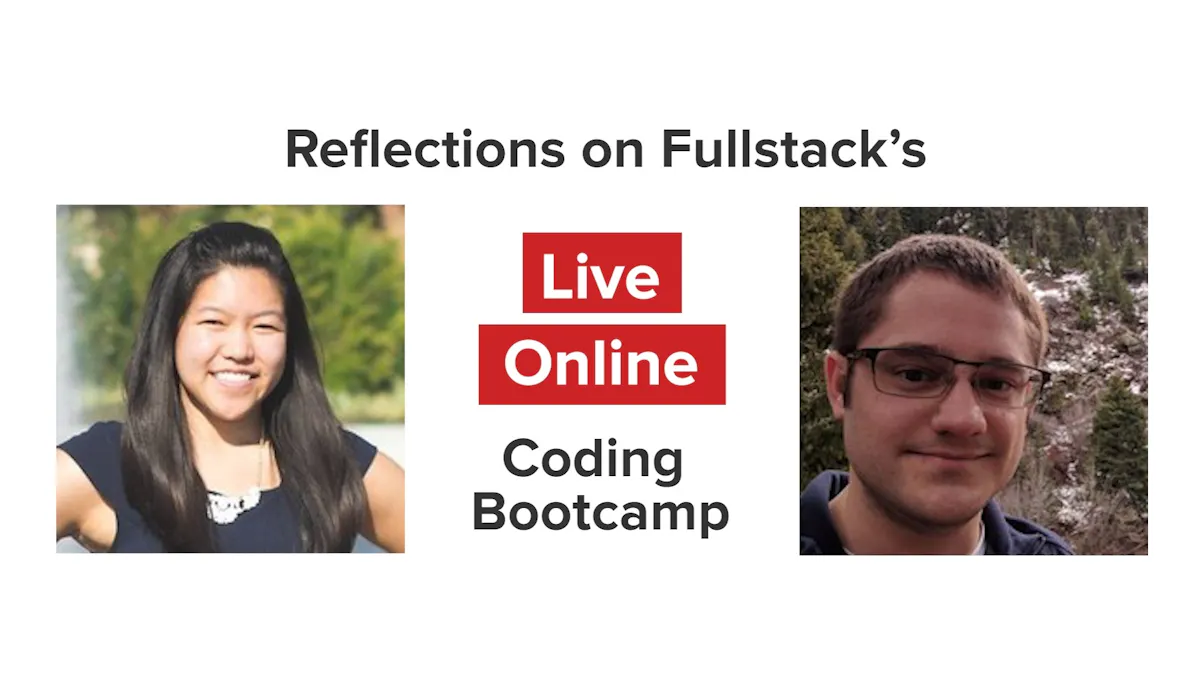Fill out the form to get more information about the Fullstack Academy bootcamp of your choice.
10.27.2022
Watch: Two Alums Reflect on Their Online Coding Bootcamp Experience
By Emily Gregor

Fullstack Academy is continuing to operate remotely due to the impact of COVID-19. Learn more about our reopening plan.
Once we started seeing the benefits of teaching online, we decided to reinstate our Live Online Coding Bootcamp (formerly called the Remote Immersive) to make coding more accessible for students who don’t live in Chicago and New York.
The 17-week, full-time program will run from June 15 to September 11 and feature the same curriculum, instructors, and projects that make our flagship Software Engineering Immersive program successful.
The application deadline for the Live Online Coding Bootcamp is May 3—learn more about the program on our website.
To help incoming students get a sense of what learning remotely is really like and how it can even be more effective than in-person learning, we caught up with 2016 Remote Immersive alums Bethany Qiang, software engineer at Macmillan Learning, and Mark Hario, software engineer at Denovo Ventures LLC.
This interview has been edited and condensed for clarity.
What made the Fullstack Academy Live Online Coding Bootcamp a good fit for you?
Bethany Qiang (BQ): What drew me to Fullstack is the community and the instructors. Everything I had heard and everyone I talked to were fantastic. Everyone was really passionate about what they did and was really passionate about wanting to share what they did. My remote experience was fantastic.
Mark Hario (MH): I knew what I wanted to do, but I didn’t want to go to a state university and spend a quarter of a million dollars over four years, so instead I spent a tiny fraction of that over four or five months. I got into my new career at the cost and time of one semester at a state university. For me, it was a really beneficial option.
How did the Live Online Coding Bootcamp prepare you for your current careers?
BQ: I’ve been working fully remotely since last summer. Fullstack was kind of the trial period for how to get everything set up and how to actually focus on work for eight hours a day versus getting distracted, and I think a lot of that has been beneficial for my current role. One of the greatest strengths of Fullstack’s program is that it teaches you how to learn, rather than teaching you specific technologies.
MH: I like the phrase, “productive struggle,” because sometimes we’d get frustrated, and you need to learn to not be frustrated and chip away until you figure out the whole project. It’s an approach to learning how to learn and problem-solving, and pair-programming was interesting too.
How does pair programming work on video?
MH: It’s similar to using Zoom. You can share your desktop screen so you can bring up the code you’re writing and show them what you’re seeing on your browser. Some of the tools are getting more developed now, too, like VS Code, where you can actually remote into and edit the same code base simultaneously. It makes working together remotely almost easier than doing it in-person.
BQ: In terms of how we do pair programming now, it’s very similar to what we did in Fullstack. We get on a video call with each other, share our screens, walk through what we’ve done, what we’re seeing in our browsers, and just working together from there. I’ve done it both in-person and remotely and I almost prefer doing it remotely because you don’t have to crowd around someone’s screen, both of you aren’t trying to take over the keyboard…
MH: It’s almost more efficient to work that way.
What advice do you have for students who are considering attending a Live Online Coding Bootcamp?
BQ: You get out of it what you put into it. Make sure to set the expectation that this will be your life for the next four months and get a routine set up. Take care of yourself mentally and emotionally during the time—it’s going to be a lot. You’re going to be overwhelmed, but you’re going to get through it. Your instructors, your teaching fellows, and your classmates will help you. Everyone wants to help everyone succeed.
MH: Just take the plunge. Nothing changes unless you change it, and if you’re thinking about it, you probably want it, so just make it happen. You’ll probably be glad you did, especially now with COVID going on—our work has hardly been influenced.
Start learning JavaScript fundamentals today by signing up for one of our online prep courses.



